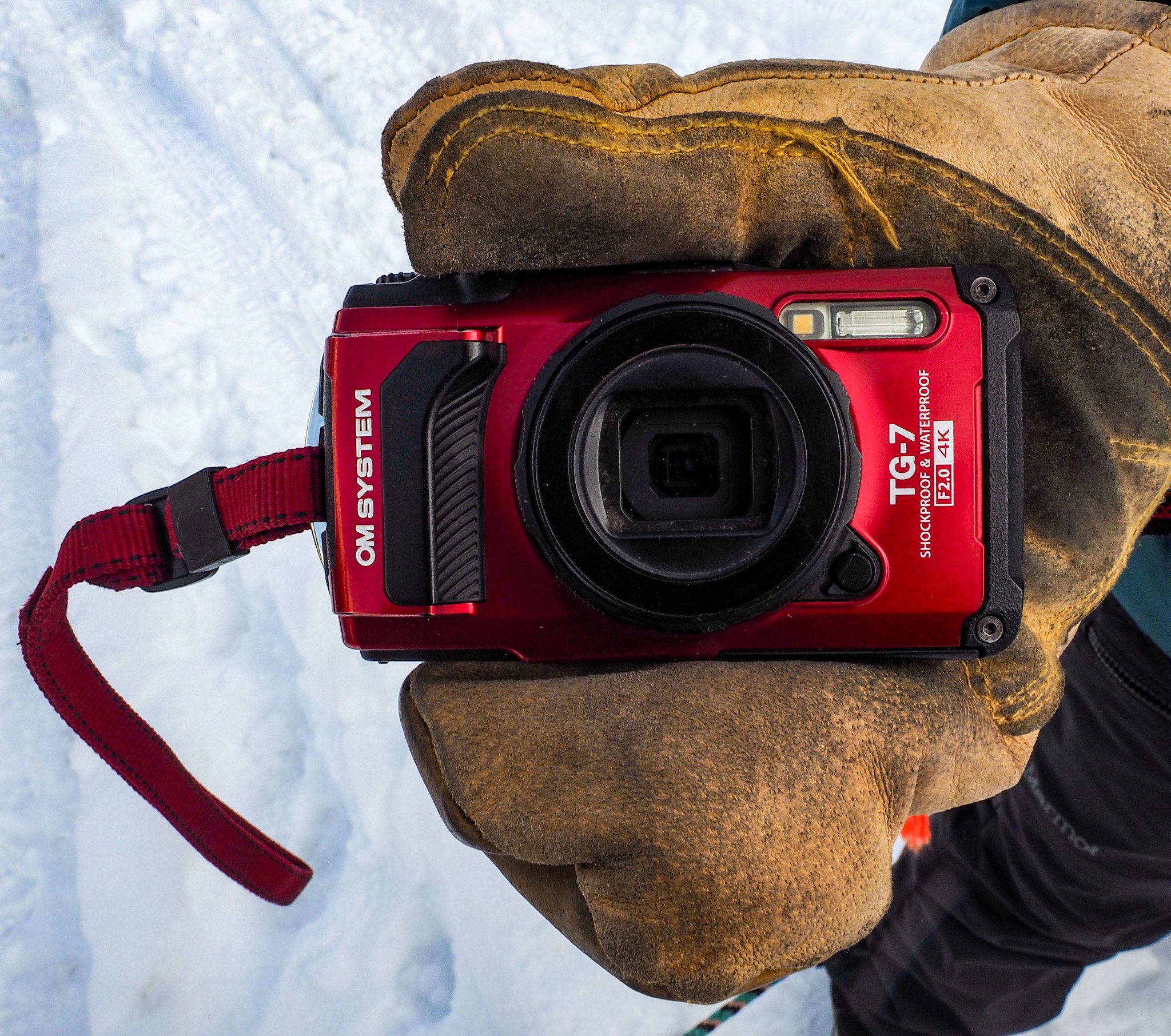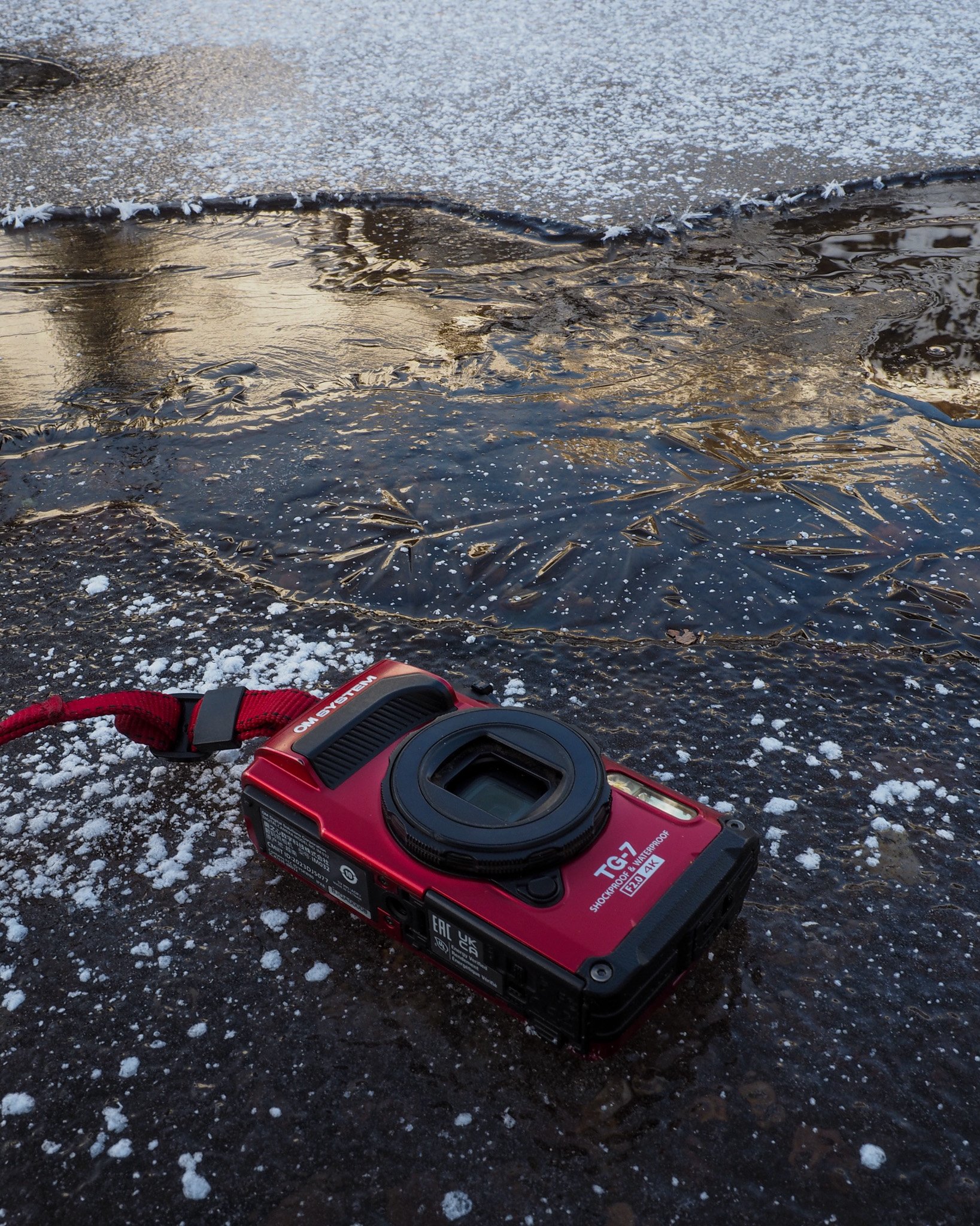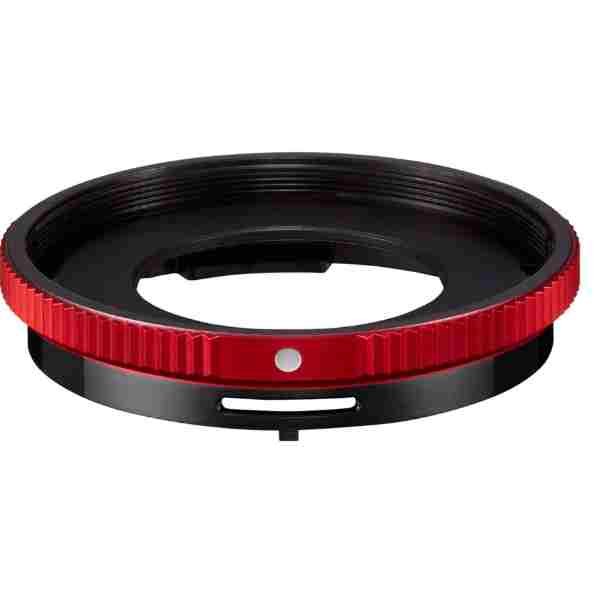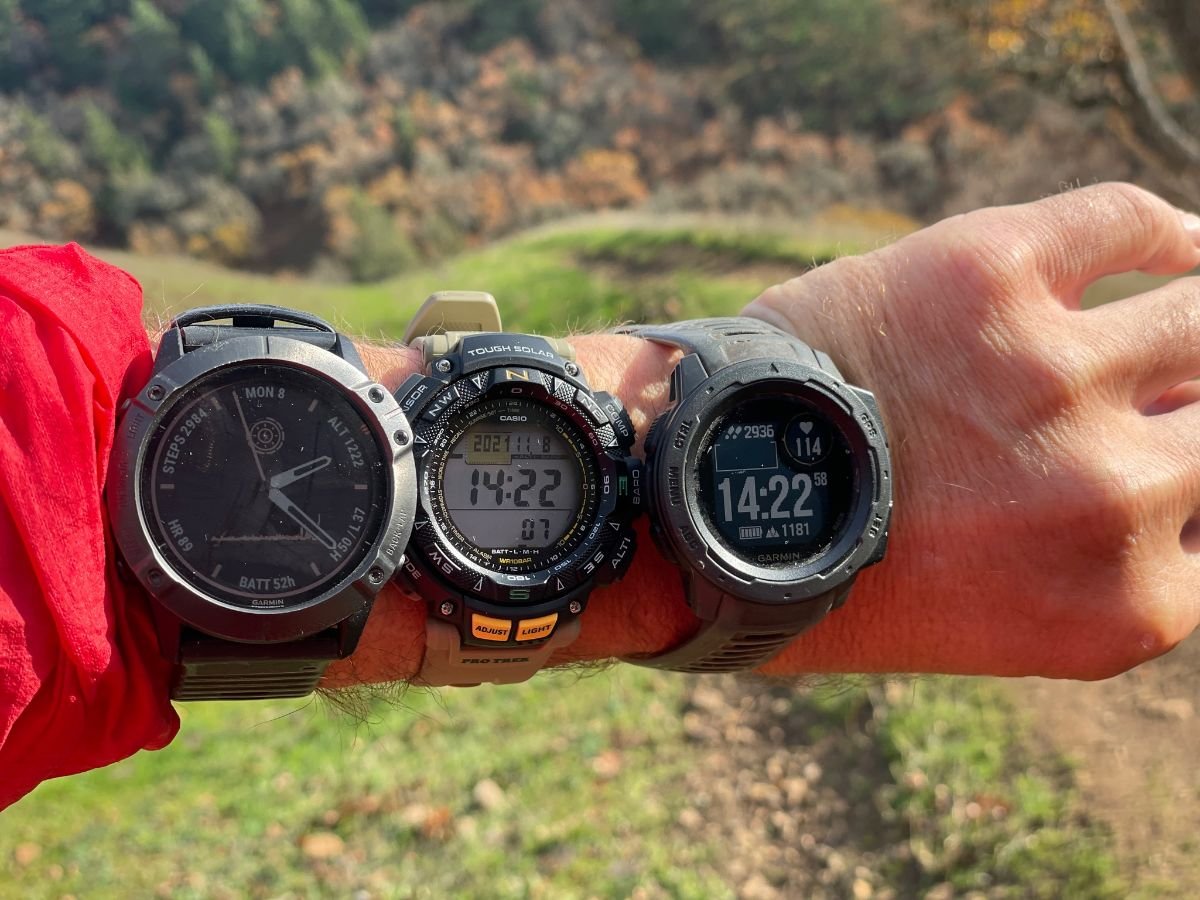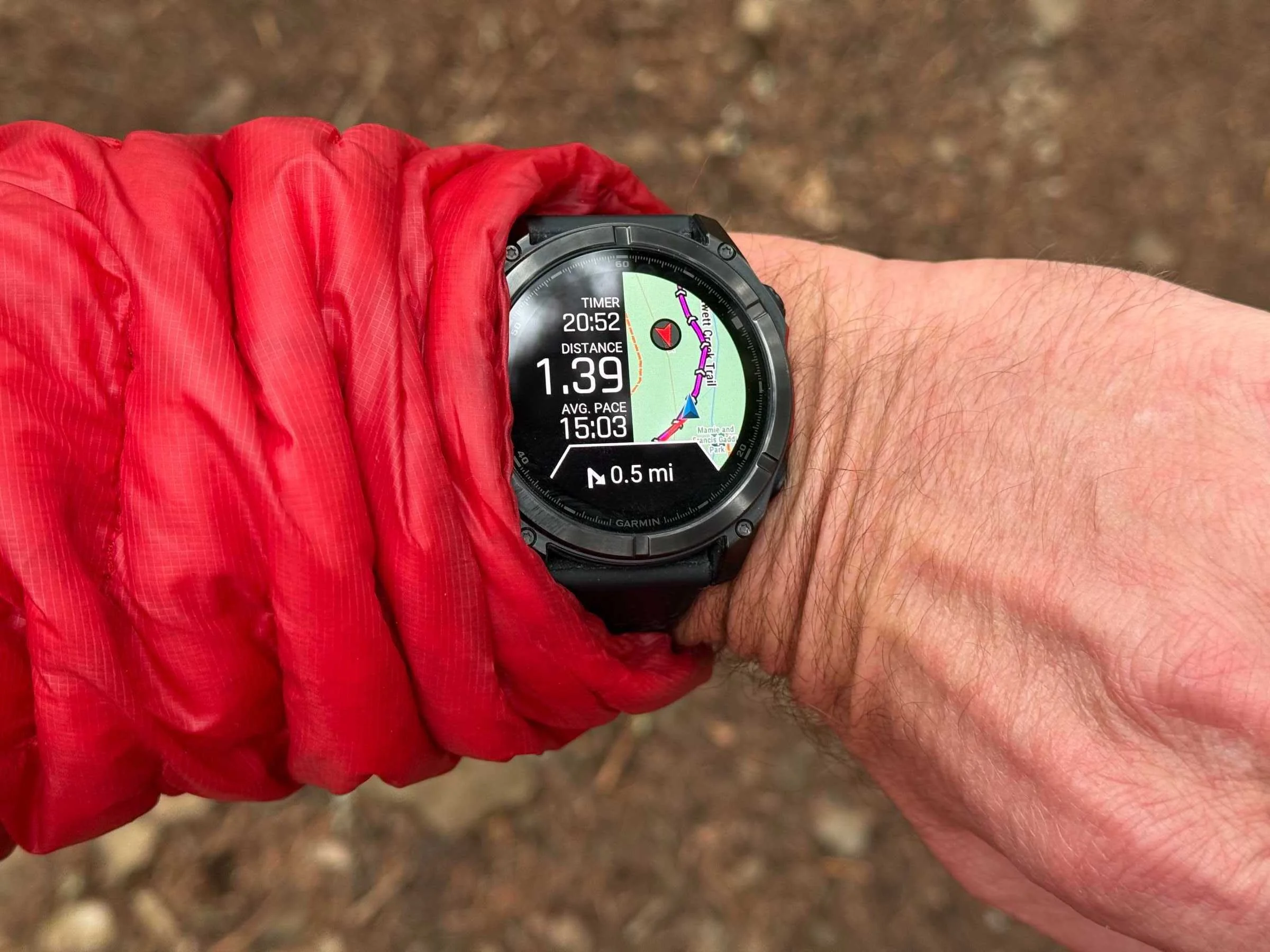OM System TG-7 Rugged Camera Review
IN-DEPTH REVIEW OF the new Waterproof, Shockproof, Freezeproof camera
The OM System TG-7 has improved the grirp, shown on the camer's left side, to enhance the ability to hold it even with mittens or gloves. The newly designed grip is especially helpful for holding the camera vertically. (Dean Krakel, Special to Treeline Review)
February 2nd, 2024
OUR VERDICT
The Tough TG series cameras, which started production in 2009 under the Olympus brand name, has been our top-rated, go anywhere on any adventure camera since we first reviewed it in 2019. The new OM System TG-7, which started production in September 2023, builds on that rugged reputation with some improvements over the Olympus TG-6.
Like its predecessor, the OM Systems TG-7 is virtually indestructible: waterproof, shockproof, freeze-proof, crush proof,dustproof, and functions in a wide latitude of temperatures from 14 degrees to 104 degrees Fahrenheit. The camera functions reliably in a multitude of climates, from humid rainforests, desert, high altitude mountain environments, and underwater.
The OM System TG-7 still upholds the solid reputation for creating beautiful images in harsh conditions that has earned our respect and top-rated berth for a go-anywhere, do-anything adventure camera that will never let you down.
For more on the Tough TG rugged cameras, see my article on Best Rugged Cameras - Waterproof, Shockproof, Freezeproof.
We create reader-supported, objective gear reviews independently selected by our editors. This story may contain affiliate links, which help fund our website. When you click on the links to purchase gear, we may get a commission — without costing you an extra cent. Thank you for supporting our work and mission of outdoor coverage for every body! Learn more.
SPECS
Weight: 7 ⅞ ounces with battery and card
Dimensions: 4.49 x 2.6 x 1.3 inches
Display size: 3 inches
Battery: LI-92B Lithium-Ion Battery
Resolution: 1.04 million dot LCD monitor
Optical zoom: 20-100mm
Video resolution: 4k 30p video recording, uncropped with a recording time limit of about 5 and a half minutes. For Full HD 60p the recording time extends to about 11 minutes.
Connectivity: WIFI and Bluetooth
Charging: USB-C
Waterproof depth: waterproof up to a depth of 49 feet
Shockproof: Yes
Freezeproof: Yes
HDMI Connectivity: Yes
WHAT WE LIKED
The OM System TG-7 camera photographed in its element, the rugged outdoors. on a cold morning beside the Taylor River near Almont, Colorado. (Dean Krakel, Special to Treeline Review)
I have used the Olympus Tough TG series since the TG-4 came out in 2015. I carried that model on my thru hike of the Colorado Trail. In 2018 I carried the TG-5 on the Continental Divide Trail. The TG-6 has been my favorite everyday walk-around camera since it came out in 2019.
The TG-7's automatic exposure mode allows fleeting moments such as this sunset reflection of Mt. Crested Butte easy to take. (Dean Krakel, Special to Treeline Review)
Although I am a professional photographer, nearly 90% of the personal photographs I take on a daily basis are taken with the TG-6. I believe that a photographer should never be without a camera, and the TG series has always fitted neatly in a shirt or jacket pocket to aid in that carry-around ability. The camera’s weight, small dimensions, and intuitive features are quick to use, and the quality of the photos outstanding. I have, on occasion, when circumstances called for it, used my TG-6 camera on assignments.
Hill Lassik pauses to take in the scenery during a backcountry ski near Cottonwood Pass, Colorado. The TG-7's ease of use and easy to use controls makes it easy to capture scenes such as this effortlessly. (Dean Krakel, Special to Treeline)
The TG-7 is no exception to this. I have carried the TG-7 around with me for the past 3 months and subjected it to all kinds of unintentional abuse. The TG-7 fell out of my pocket and clattered to the bottom of an icy chute; it fell off my truck’s tailgate onto rocks; I accidentally dropped it into a mud hole and, to add insult to injury, drove over it with my truck before I realized what had happened; I’ve carried it in my mountain bikes and fat bikes frame bags; mixed it up with dog treats in my pants pockets; stored it in the center compartment console of my truck and left it overnight in hot and below freezing temperatures and stuck it into freezing river water for long minutes of time attempting to photograph Kokanee Salmon fry. More recently, I left the TG-7 outside in -16F degree weather overnight and, after warming it up in my pocket, took photos with it on a snowshoe hike.
Through it all, the TG-7 has never failed me.
While the TG-7’s indestructibility is one of its strongest features, what really sets it apart from other cameras I have used is the quality of the images it takes. The TG-7, like its predecessor the TG-6, simply takes beautiful, well-exposed images. This easy-to-use and easily accessible camera captures what I see in my mind’s eye as I’m hiking or skiing or biking
WHAT COULD BE BETTER
While the TG-7 boasts a brighter and more color accurate–closer to what you’re actually seeing–LED viewing screen, the screen is impossible to view if a person is wearing sunglasses. This makes photographing brightly lit snow scenes a bit challenging. I would like to see an attachable form of lens hood that would shade the LED screen.
It would also be helpful, although it would increase the camera’s weight and size slightly, if the LED screen could be popped out and rotated so that the viewing could be done from different angles.
TARGET AUDIENCE AND RECOMMENDED USE
Because the TG-7 can be carried in a shirt or jacket pocket or a bike frame bag it makes photographing challenging and fun things easy. The camera is easy to carry and easy to use. With it on hand there's no reason to miss a moment such as this mountain biker negotiating a difficult passage on the Sawtooth trail near Gunnison, Colorado. (Dean Krakel, Special to Treeline Review)
The OM System TG-7 is intended for outdoor users who want to take photographs or videos in rugged environments. But it is not limited to that. The TG-7 is a take-anywhere camera that can be used reliably in a wide range of places. It’s a perfect camera for travelers and adventurers.
DESIGN AND BUILD QUALITY
The worst weather makes for the best photographs. Dean Krakel working with the OM System TG-7 during a ski tour near his home in Almont, Colorado. The OM system tough cameras are at home in harsh conditions in the outdoors. (Laine Walter, Special to Treeline Review)
RUGGED FEATURES AND DURABILITY
As mentioned previously, I have put this camera through the ringer, and it continues to hold up. The TG7 is constructed of a metal and plastic body sealed against dust and water and designed to be crushproof, shockproof, and freezeproof. The battery and SD memory card are contained in a secure, sealed, locking compartment that protects against accidental opening and allows the TG7 to be used underwater.
Different from the TG model cameras before it the OM System TG-7 has a redesigned and more ergonomic body, including a thumb rest with grips to aid in holding it. The camera's controls are designed to be easily used on the camera's back next to the enhanced LED screen.shown as well (Dean Krakel, Special to Treeline Review)
ERGONOMICS AND USER-FRIENDLY DESIGN
The TG-7 has improved the grip on its backside and the front-side thumb grip. The backside grip is most useful for holding the camera vertically. The camera's features are easy to reach and use and are intuitive in their locations. A lot of thoughtful, user-friendly design has gone into producing how the TG-7 controls function and where they are located.
IMAGE AND VIDEO QUALITY
The OM System TG-7 has a motor drive capable of taking anywhere from 5-20 frames per second, fast enough to capture the author's dog, Pelli, catching snowballs. The TG-7 also offers a Pro Capture mode that takes pictures at 10 frames a second and stores the images in the camera's memory until the shutter button is released. (Dean Krakel, Special to Treeline Review)
SENSORY SPECIFICATION
The TG-7 still uses the same Type 1 2.33-inch 12 Megapixel CMOS sensor that came out with the TG-5. Some smartphones utilize a larger sensor. Increasing the size of the sensor would also require increasing the dimensions of the TG-7 to accommodate it, thus taking away some of its compact portability.
IMAGE RESOLUTION AND CLARITY
Wind blows snow off the branches of a pine forest on a trail near Cottonwood Pass, Colorado. The TG-7's scenic mode makes scenes like this easy to capture. The camera's size and weight make it easy to reach in a jacket or shirt pocket. (Dean Krakel, Special to Treeline Review)
The TG-7 has 12-megapixel resolution through its 1⁄2 .3-inch sensor for clear and detailed images. The camera also offers enhanced digital image stabilization for all situations, but is most noticeable in low light, its panorama mode, and night photography.
VIDEO RECORDING CAPABILITIES
The TG-7 has outstanding video capability and a built-in stereo microphone, offering full HD video recording at a frame rate of 120p and supporting a higher frame rate of 240p in HD. The TG-7 can take video in 4K resolution at 30 frames per second.
New from the TG-6 is the TG-7’s ability to take vertical format videos, unusual for a compact camera and one that can also be used underwater–a format-friendly nod to users who post to social media.
RAW IMAGES
For advanced edition possibilities, the TG-7 can take RAW images as well as JPEG images. The camera can also take RAW and JPEG images simultaneously. This allows for a quick ready-to-use or transmit image immediately, JPEG, and a RAW image for editing later.
PERFORMANCE
The TG-7's Macro photography mode can capture dramatic closeups of subjects. The camera also has a microscope mode for photographing details as tiny as the patterns of a snowflake. (Dean Krakel, Special to Treeline Review)
AUTOFOCUS
The TG-7’s fast 2.0-4.9 lens aperture, fast autofocus lens that zooms with a push of a button from a wide 25mm to a short telephoto of 100mm, and its macro and super macro capability make it able to cover a wide range of subjects, from landscape to portraits to morning dew on flower petals or snowflake patterns.
The author's dog, Pelli, poses for a portrait taken with the OM System TG camera, showing the camera's ability to blur out the background and keep the main subject sharp. (Dean Krakel, Special to Treeline Review)
SHOOTING MODES
While unchanged from the TG-6, a diversity of shooting modes also sets the OM System TG-7 apart from other compact cameras.
There are four specific Macro modes: microscope, microscope control, focus bracketing, and focus stacking – all designed for photographing close-ups.
The TG-7 has 5 underwater shooting modes: underwater wide, underwater snapshot, underwater macro, underwater microscope, and underwater HDR video.
The TG-7’s additional shooting modes include auto, aperture priority, program, and scene. Within the scene setting there are 22 different options.
The TG-7 features a Nighttime Live Composite mode along with in-camera time-lapses, art filters, and picture modes.
SPECIAL FEATURES
GPS AND OTHER NAVIGATION FEATURES
The TG-7, like the TG-6, offers environmental sensors and tracking. The camera has a GPS, compass, barometer, altimeter/depth gauge, and thermometer, all of which can be embedded in the photo’s metadata. The camera’s GPS can track your hike, drive, or dive, and show your route and where the photos were taken. These features are turned on with the flip of a switch on the camera’s top. I’ve accidentally turned this on many times and caused battery drain.
CONNECTIVITY OPTIONS (WIFI, BLUETOOTH)
One feature I have always liked and found useful is the ability of the TG cameras to create their own hot spot and connect by WIFI anywhere in the world. With this feature, you can download photos to a cell phone by using the free OM Image Share app. The app also allows a user to edit photos and take photos remotely.
USER INTERFACE AND CONTROLS
When the author's dog, Pelli, left a snowy trail near a frozen creek it made for a nice composition that would have been missed if not for the TG-7's auto exposure and the fact that it was carried in a jacket pocket where it was easy to reach. (Dean Krakel, Special to Treeline Review)
The TG-7’s zoom and shutter button controls are all easily accessible on the camera’s top right side–even with gloves. All other shooting functions and program menus are available on the camera’s back right side. These are easy and intuitive to use.
MENU SYSTEM AND EASE OF NAVIGATION
One nice feature of the TG-7 is the ease of using the camera’s menu and information button, all located on the right back side. A person, even with little experience with the camera, can easily navigate through all the options available. The menu and information are brightly displayed on the LED screen and moved through with the “up” “down” “okay” buttons located on the camera’s lower right back side. This button is also used for setting time-lapse photos and adjusting automatic exposure bracketing.
BATTERY LIFE
Powered by a rechargeable, in-camera, lithium-ion battery, the TG-7’s battery life is listed as 330 shots per charge. For recording video the battery is rated to last for 50 minutes. My own experience is that a battery, in a camera I carry around every day, lasts for about one week of sporadic shooting time before needing to be recharged.
On cold days I keep the camera inside a jacket pocket to keep it warm. Cold drains batteries fast. The battery power is visible on the camera’s viewing screen, with orange being the danger zone. I have sometimes, on bitterly cold days, revived the battery out of the orange zone by putting the camera back inside my jacket for a few minutes. But this is an unreliable technique at best. Better to carry spare batteries!
Typically charging the camera battery is done by using the TG-7’s built-in charging port and USB cable and plugging it into a computer. Charging the battery in the camera takes about 3-6 hours for a full charge.
The camera cannot be used while it is charging.
CHARGING OPTIONS
An optional AC charging adapter is available, as well as a charging unit that can charge the battery outside the camera.
OM SYSTEM TG-7 VS OLYMPUS TG-6
The OM System TG-7 camera (left) and the TG-6 (right) showing how little has changed physically in size and weight between the two camera models. The TG-7 has incorporated some changes that can be seen on the outside of the camera that include a better thumb in back and finger grip in front along with a brighter LED screen. (Dean Krakel, Special to Treeline Review)om-
IMPROVEMENTS
The TG-7 has enhanced its ergonomics with an improved anti-slip front body grip and rear thumb rest.
A brighter and more color-accurate LCD viewing screen.
The TG-7’s USB connection is now done with the more widely used Type-C instead of the Micro-B.
The TG-7 is remote control compatible with an optional wireless remote-control unit.
The camera can take vertical video so that content can be published directly to social media via Wi-Fi.
Creation of time-lapse in-camera video creation that can take photographs at intervals from 1 second to 24 hours, and the TG-7 will adjust settings to create even exposures across the frames in the final movie.
A construction mode offering in-camera post processing to enhance images and improve in high contrast lighting situations and reducing the visibility of dust particles in images.
CHANGES OR ADDITIONS I DIDN'T LIKE
Sometimes brands mess up when they update a model. I don't think that's the case with the TG-7.
ACCESSORIES
TG cameras offer a wide assortment of accessories for taking photos on land and sea.
LENS RING
An optional lens ring allows for mounting a telephoto and fisheye lens. The telephoto is equivalent to a 200mm lens, but be aware, it is of fixed length and does not zoom in or out. This accessory also creates a black vignetting around what is seen through the viewfinder that only affects what is being seen and does not affect the photo.
LIGHT GUIDE
The camera also has an optional “light guide” that uses the onboard LED to create a ring light and flash diffuser. This is very useful for macro photography as it provides even lighting.
UNDERWATER HOUSING
For photography underwater at deeper levels than the TG-7’s 49-foot limit, there is an underwater housing that increases the depth to about 150 feet. This also comes with attachments for a strobe or lamp while still allowing you to use all the camera’s controls.
FLOAT STRAP
An inexpensive float strap that goes around a photographer's wrist or arm and attaches to the camera can keep your TG-7 from quickly sinking to the bottom of the ocean/lake/river. A carabiner loop allows the camera to be clipped to a PFD (Personal Flotation Device) or scuba gear.
For additional protection and grip, a silicone jacket that slips over the camera body is available.
LENS COVER
One handy feature is a lens cover that protects the front element and opens and closes with an easy twist.
CONCLUSION
A rainbow appears during a rainstorm above an autumn aspen tree grove near Gothic, Colorado. Because the TG-7 is weatherproof it can be used in wet conditions without worry and it's exposure controls, from Scenic to Automatic allow a photographer to quickly react to the ever changing light situations. (Dean Krakel, Special to Treeline Review)
WHY OUTDOOR AND ADVENTURE ENTHUSIASTS MAY WANT A RUGGED CAMERA
While some outdoor adventurers may rely increasingly on the use of their cell phones and question investing in a rugged, tough camera like the TG-7, just try sticking a cell phone underwater, shooting pictures in pouring rain, using it in sub-zero temperatures, or dropping it on rocks. Cell phones remain fragile with short battery life. Cell phones can make a nice backup for a camera like the TG-7 should it ever stop working while in the field. But really, the chances of that happening with this TG are quite remote.
OVERALL ASSESSMENT OF THE OLYMPUS TG-7
In short, if you’re looking for a camera that is as ready for adventure as you are, that can hold up in the ruggedest, harshest environments, from climbing to diving, a camera that can deliver high-quality professional images and deliver time and time again, the TG-7 is the camera you’re looking for.
Those same qualities make it the perfect companion for casual adventurers and non-adventurers as well. The TG-7 is at home taking family photos and making memorable vacation snapshots with the added bonus that you’ll never have to worry if it gets dropped in the pool.
FINAL THOUGHTS ON THE VALUE FOR THE MONEY
A casual drive up the Cement Creek valley near Crested Butte presented a photo opportunity that lasted for a few brief seconds. Time enough for the TG-7's automatic exposure and zoom lens to compose and capture the moment. (Dean Krakel, Special to Treeline Review)
While the TG-7 has made some improvements over the TG-6, the upgrades aren’t significant enough to warrant replacing a TG-6 if you already own one, or buying a TG-7 over a TG-6 if you can find one. The TG-6 currently lists for $453.00 on Amazon, and the TG-7 $549.00.
In the all-weather, all-action category of compact cameras, the TG-7 beats all in the quality of images and its rugged, nearly indestructible build. There are other compact cameras out there with bigger zooms and higher megapixels, but in our experience, none of them can hold up to the TG-7’s quality and durability in all weather and climate and outdoor sport photography.
Where to buy
The OM System TG-7 are popular gear items, so you have options when it comes to retailers. Here are some of the pros of the retailers.
Amazon
Pros: Free 2-day shipping with Amazon Prime membership
B&H
Walmart
OTHER CAMERAS TO CONSIDER
Nah.
Dean Krakel backpacking the Colorado Trail near Coney Summit. (Photo by Mary Parlange)
ABOUT THE AUTHOR / WHY YOU SHOULD TRUST US
Dean Krakel is a three-time Pulitzer-prize-winning photojournalist, photographer, and photo editor whose work appears in National Geographic, Rolling Stone, Cowboys & Indians, High Country News, National Wildlife, Outside, Time, Yoga Journal, Newsweek, and Life magazines.
With over four decades of experience, his early dramatic documentary-style photographs of the Marlboro Man shot for the Leo Burnett Agency were seen worldwide.
Krakel is the author of three books: Season of the Elk, Downriver, and Krakel’s West. In 2015, Krakel left his newspaper career at the Denver Post to hike the 500-mile long Colorado Trail; a film about that hike—The Long Haul—won a Heartland Emmy Award.
Dean’s fine art prints are valued by collectors and have been exhibited in galleries in Jackson Hole, Wyoming, and Santa Fe, New Mexico. Large exhibition prints of his photographs are on permanent display in the Denver Justice Center. Dean is based in Crested Butte, Colorado.
You can read all of Dean’s Treeline Review stories on his author page.

